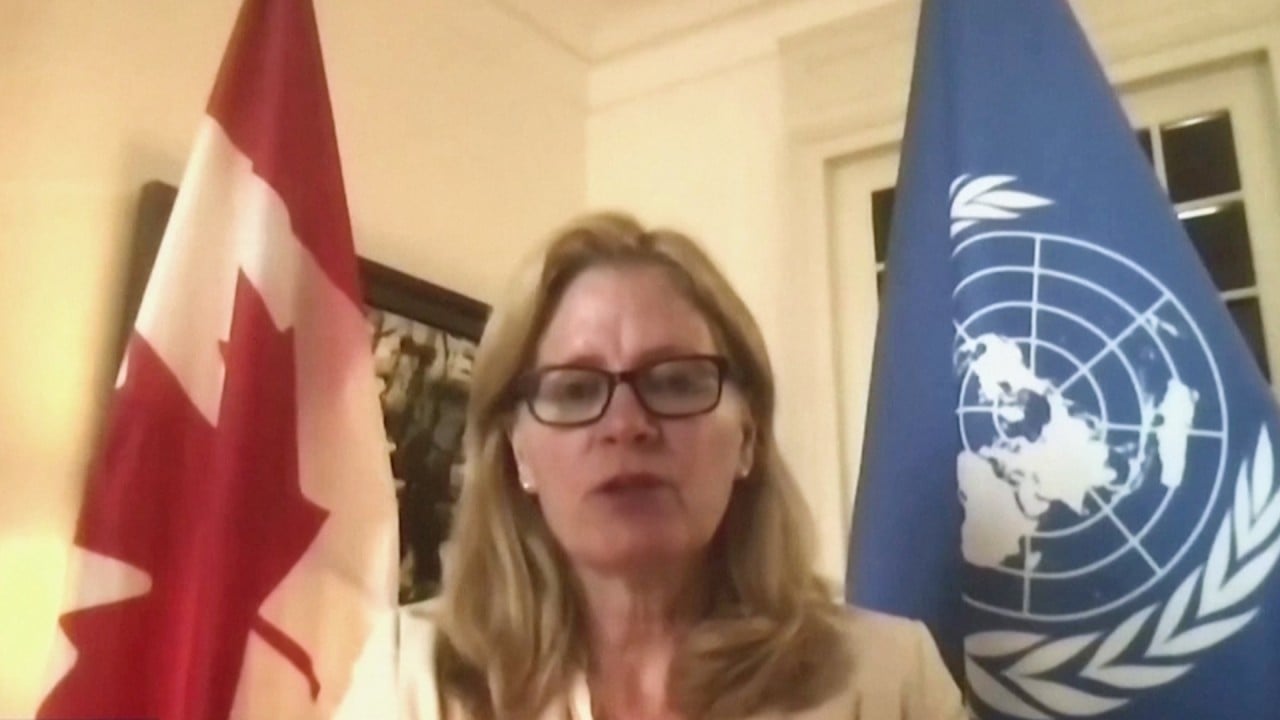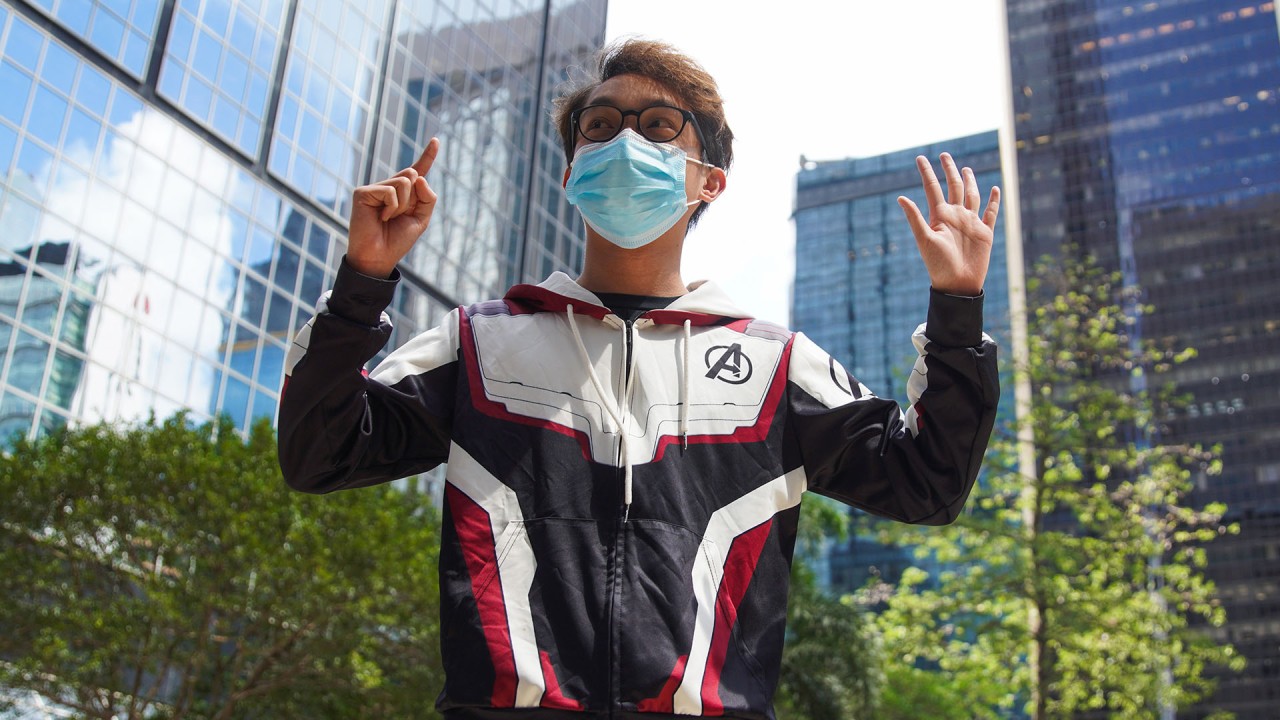
US rejoins the UN Human Rights Council, paving way for further tension with Beijing
- Washington received 168 votes out of a possible 193 at the UN General Assembly to serve on the council
- Washington will press ahead on a broad range of issues, from rights violations in countries such as China, Afghanistan and Syria, says US ambassador to the UN
Washington received 168 votes out of a possible 193 at the UN General Assembly to serve on the council, based in Geneva.
“Having fulfilled President Biden’s campaign pledge to rejoin the Human Rights Council, we can work to ensure this body lives up to these principles,” said US ambassador to the UN Linda Thomas-Greenfield minutes after Thursday’s vote.
Washington will press ahead on a broad range of issues, from rights violations in countries such as China, Afghanistan and Syria, to broader themes, including women’s rights, racial and ethnic injustice and violence against minority groups, she said.
“Finally, we will press against the election of countries with egregious human rights records and encourage those committed to promoting and protecting human rights both in their own countries and abroad to seek membership,” Thomas-Greenfield added.

01:11
Canada leads call by more than 40 countries for China to give UN access to Xinjiang
“The US will be more willing to push back, particularly if China says something egregious. But I don’t see them doing much against China other than that,” said Brett Schaefer, a fellow with the conservative Heritage Foundation think tank, adding that he does not expect a US-backed resolution against China.
China urges ‘objective, scientific’ focus for WHO’s next Covid-19 origins hunt
“I don’t expect the Human Rights Council to pass a resolution on China,” Schaefer added. “Part of that is China’s growing influence at the UN – so far it’s prevented that from passing – and because the US and EU are reluctant to confront them in that venue, afraid of losing a referendum.”
The outcome of Thursday’s vote was all but ensured, given a voting system under which uncontested seats are often allocated in advance within geographical groups. Italy gave up its seat so the US could run.
Council elections are staggered. The United States was one of 18 nations elected for the next three-year term, having left the 47-member body in 2018 under the Trump administration, a harsh critic of multilateral organisations. China’s three-year term started in early 2021.

Others expressed concern that the US-China stand-off and broader acrimony between democracies and authoritarian states seen in the council recently will continue to overshadow proceedings. The US gained observer status on the council in February.
“The US’ all-consuming focus on human rights in China, and China’s rather petulant overreactions, are ‘capturing’ the council, or, as some have said, ‘sucking the oxygen’ from the body’s other important areas of work,” said Geneva-based think tank Universal Rights Group in a report Wednesday, citing European concerns.
Prince William says space race is not what planet needs right now
One silver lining, and an area of potential cooperation between Washington and Beijing, however, was the council’s recognition earlier this month of a new universal human right, namely the right to a clean, healthy, and sustainable environment, said analysts.
If the measure is passed by the UN General Assembly as expected, this would become the first stand-alone right fully recognised by the UN since the Universal Declaration of Human Rights was adopted in 1948.
Critics have decried the lack of competition or transparency in council elections.

06:55
Hong Kong’s biggest opposition alliance, the Civil Human Rights Front, faces government ban
In a statement after the vote, Idaho Republican Senator James Risch slammed the election as an undemocratic “sham” and the Biden administration for rejoining the council without securing reforms.
“The United States should not be lending its legitimacy to a body that includes perpetrators of human rights abuses like China, Venezuela, and Cuba,” said Risch, the top Republican on the Foreign Relations Committee, in a statement. “The Biden administration will pat itself on the back for rejoining this flawed body.”
Others argue that in rare cases where a genuine contest occurred, the council was able to uphold its mandate to call out and act against countries where alleged abuses take place. Last year in a rare development, Saudi Arabia was denied a council seat after the killing of journalist Jamal Khashoggi inside the Saudi consulate in Istanbul, Turkey.
‘North Korea’s got talent’? video of topless soldiers doing stunts goes viral
“UN member countries should ensure that all regional slates in future Human Rights Council elections are competitive,” said Louis Charbonneau, UN director with Human Rights Watch. “As we saw with Saudi Arabia’s failed bid for a council seat in 2020, it’s the best way to keep abusive candidates off the council.”
The discord in the just concluded session of the council, which lasted 13 months ending on October 11, was reflected in the numbers, analysts said.
Some 42 per cent of texts were subject to a vote, a step generally unnecessary when there’s broad agreement, compared with 26 per cent during the prior session. And 28 per cent of adopted resolutions saw hostile amendments – designed to kill or seriously dilute a resolution – compared with 8.5 per cent in the previous session, according to Universal Rights Group.

“Much of the acrimony was centred on, and much of the growing division generated by, the ‘great power’ rivalry of, on the one side, the US, together with its Western allies, and on the other side, China, Russia, Saudi Arabia, and their partners,” the think tank added.
One example of the growing discord and tit-for-tat proceedings at the council was seen earlier this year when, in response to repeated US statements over its record, China tabled two draft resolutions in the council.
One centred on the “legacies of colonialism”, seen as a thinly veiled swipe at the US and United Kingdom. And the second focused on “realising a better life for everyone”, part of Beijing’s bid to reshape the global human rights system and emphasise the power of states over the rights of individuals.
“A clearly shaken China reacted to this de facto loss of face by withdrawing its draft resolution on ‘realising a better life for everyone’,” wrote Marc Limon, Universal Rights Group’s executive director.

02:46
UK parliament declares Uygurs suffering ‘genocide’ in China’s Xinjiang
In a statement Thursday, US Secretary of State Antony Blinken said the council had merits but was flawed, including its inclusion of members with “egregious human rights records” that try and subvert the council’s founding ideal, namely that states are obliged to protect individual human rights.
Even as both giants and their allies face off, their audience is in many ways the many African, Latin American and Asian nations with ties to both Washington and Beijing.
“How many countries are going to support China or the US, a lot depends how US does in addressing its interests and how it’s perceived. Unfortunately the administration is doing poorly right now,” said Schaefer, referencing the Afghanistan pull-out.
“When the US sends a letter talking about Xinjiang, China responds with its own letter with more people on it. There’s a real tit-for-tat dynamic.”

